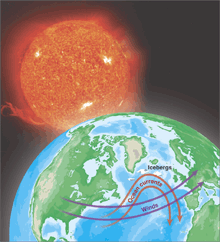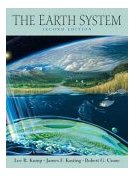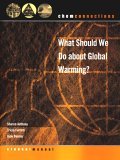Fire and Water, Fall 2006http://academic.evergreen.edu/curricular/fireandwater/ For more details, see our Moodle WEBSITE | ||||||||||
| ||||||||||
|
General INFORMATION: First day of class: Monday 25 Sept. at 2:00 pm in Lecture Hall 2 Class Standing: Sophomores, juniors and seniors; transfer students welcome. Prerequisites:
General biology, solid algebra skills; good reading, writing, and thinking ability;
willingness to work in teams Program description: The Sun’s energy and its interaction with the land, atmosphere, and oceans affects the Earth’s climate. Over geologic time the Earth has experienced wide fluctuations in climate, such as ice ages . Earth is currently experiencing a rapid warming trend, purportedly caused by anthropogenic (human-caused) changes in atmospheric composition. A major factor determining global climate is the intensity of the Sun's energy reaching the Earth. However, climate changes cannot be explained by variations in solar radiation alone. Climate changes involve complex interactions between astronomical and Earth-bound processes. This program will examine some of these interactions. Specifically, we will examine how the Sun's output has varied over geologic time and recently. We will also examine how the oceans impact global climate by redistributing the Sun's energy and affecting the composition of the atmosphere. We will discuss how changes in ocean circulation may explain climatic changes over geologic time. We will also study how marine microorganisms play a major role in the cycling of gases that affect climate (e.g. CO2 and Dimethylsulfide). Finally, we will discuss contemporary global warming, examining the contribution of human activities and fluctuations in solar output. We will critique proposed schemes to engineer solutions to global warming, such as the sequestration of anthropogenic carbon into the deep sea. Our study will examine various physical, chemical, geological and biological processes. This requires a basic understanding of biology and chemistry as well as facility with algebra and an ability to learn pre-calculus. The material will be presented through lectures, workshops, laboratories and seminars. We will draw on the primary literature whenever possible for a rigorous scientific treatment. Students will do significant teamwork and will research in depth questions of particular interest. We will have weekly online assignments, so students should be comfortable using computers and the Internet. Credit awarded in introductory
physics, earth science, marine science, and environmental studies. Evaluation: Student work will be evaluated through exams, general participation, written and oral reports, seminar essays and a research project. General schedule: see our Moodle WEBSITE Thanksgiving week we will have classes on Monday and Tuesday, so we can end the quarter one week early. We will have Thanksgiving Thursday (and Friday) off. Please plan accordingly. Textbooks: Some of these texts may be available in the Bookstore. Your safest bet is to order your texts online in August. Get the most recent edition. You need all underlined texts the first day of class except Gaia (which we will read later in the quarter).
Sources for texts: Powell's books, www.campusi.com, www.addall.com, www.Amazon.com
| ||||||||||






